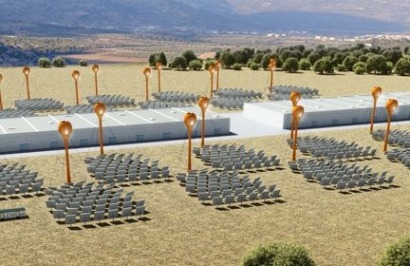
According to company officials, the beauty of their system is that it is both more affordable and more flexible than traditional CSP technology.
“This is not a power plant, it’s an energy solution,” said Pinchas Doron, chief technology officer of the Rehovot, Israel-based firm, to reporters invited to attend the event.
Tulip’s solar thermal technology has been configured in compact, modular units of 100kWe each, which are fed by 52 heloistats. The tower itself stands 120 feet.
AORA's innovative energy generating system is designed to require less land and less water while generating more usable power and heat than other solar energy systems.
The company's hybrid approach enables the system to run not only on solar radiation, but on almost any alternative fuel as well, including biogas, biodiesel and natural gas. This enables a variety of operation modes – from solar-only mode, where electricity is supplied from ample sunlight, to hybrid-mode, where fuel helps generate electricity when sunlight is insufficient, such as when it is cloudy, to fuel-only mode during night hours or heavily overcast periods, thereby guaranteeing an uninterrupted power supply 24 hours a day.
In addition to producing electricity, the Almeria plant also produces 170 kW of heat as a byproduct, which will be used to power a desalination plant. The station was constructed over a period of seven months, and is designed for a minimum economic lifespan of 25 years.
The first AORA power station was constructed in Kibbutz Samar, Israel.
"We are very excited to complete construction on our second power station, and we look forward to demonstrating our unique ability to provide our customers with uninterrupted, 24/7 clean-power," said Zev Rosenzweig, AORA's CEO.
"Our technology and scalable solution can be easily customized for a variety of applications and environments and I believe this demonstration unit will be quickly followed by additional installations in Spain and around the world," Rosenzweig added.
For additional information:

